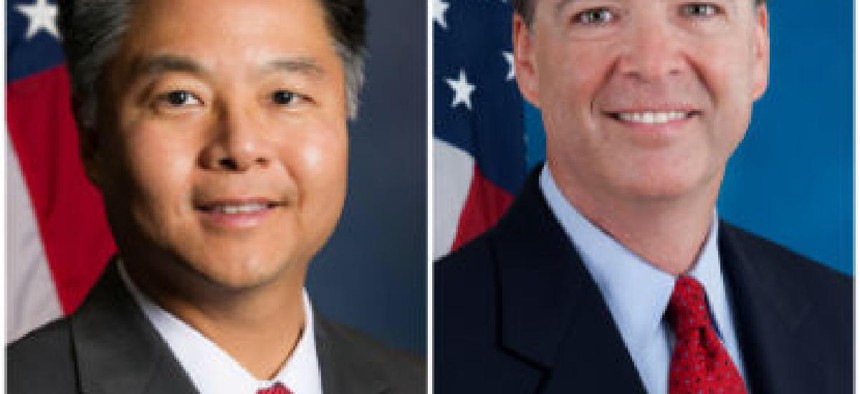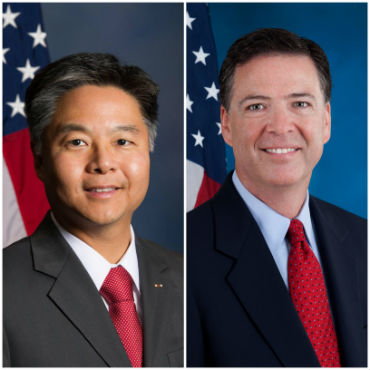Lieu asks Comey to back off Apple court order

In a letter to the FBI director, Rep. Ted Lieu (D-Calif.) argued that forcing Apple to unlock the San Bernardino shooter's phone could have adverse Internet security consequences.

Rep. Ted Lieu (left) told FBI Director James Comey that he should not "use a lawsuit to circumvent the critical and necessary policy discussions" about encryption.
Rep. Ted Lieu (D-Calif.) has asked FBI Director James Comey to withdraw the bureau's demand that Apple help unlock the iPhone of one of the San Bernardino, Calif., shooters.
"As a computer science major, I have seen far-reaching unintended consequences when government applies outmoded concepts to our fast-changing technological world," Lieu wrote in a Feb. 23 letter to Comey.
Last week a federal judge ordered Apple to offer "reasonable technical assistance" to investigators trying to extract data from the iPhone 5C used by Syed Farook. He and his wife murdered 14 people in San Bernardino in December.
The court order further inflamed a debate, partly driven by Comey, over law enforcement access to encrypted communications. Technologists warn that any weakening of encryption could have adverse effects on Internet security. In this case, Apple is being asked to write new software for the phone to make it easier for the FBI to crack its password.
Apple has vowed to fight the court order, and tech giants such as Facebook have sprung to Apple's defense.
Lieu warned that the case could "open the floodgates for all future prosecutors to make the exact same demands in any case involving a smartphone that government cannot decrypt."
Comey kicked off the week with an op-ed telling opponents of the court order to "take a deep breath and stop saying the world is ending."
Lieu turned that plea on Comey. "We should all take a deep breath and talk to each other, rather than use a lawsuit to circumvent the critical and necessary policy discussions," wrote Lieu, a member of the House Oversight and Government Reform Committee's IT Subcommittee.
He said he agreed with Comey's contention that issues raised by the San Bernardino case "will matter to every American for a very long time."
Both men argue that the American people should ultimately decide the way forward on privacy and security issues. Lieu introduced a bill earlier this month that would prevent states from requiring device manufacturers to allow backdoors for law enforcement in their products.
This is not the first time Lieu has taken his pro-encryption argument directly to a law enforcement official. During an April 2015 subcommittee hearing, Lieu dressed down Suffolk County, Mass., District Attorney Daniel Conley for his suggestion that Google's and Apple's encryption gave criminals an advantage over their victims.
"It's a fundamental misunderstanding of the problem," Lieu told Conley. "Why do you think Apple and Google are doing this? It's because the public is demanding it. People like me, privacy advocates, a public that doesn't want an out-of-control surveillance state.... This is a private-sector response to government overreach."
Reuters was the first to report on Lieu's letter.
NEXT STORY: FAA Concerned about ‘Evolving Cyber Events’


